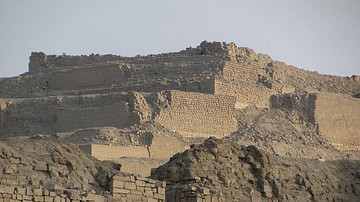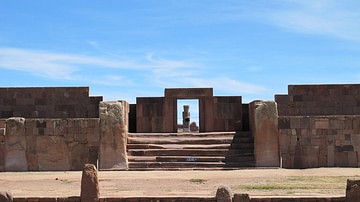Search
Did you mean: Mali Empire?
Search Results

Definition
Pachacamac
Pachacamac, located on the coast of Peru and 32 km south of Lima, was an important sacred site, oracle, and place of burial, which was visited by pilgrims of many ancient Andean cultures, including the Incas. The site, active for over 2,000...

Definition
Ardashir I
Ardashir I (l. c. 180-241 CE, r. 224-240 CE) was the founder of the Persian Sassanian Empire (224-651 CE) and father of the great Sassanian king Shapur I (r. 240-270 CE). He is also known as Ardashir I Babakan, Ardeshir I, Ardashir the Unifier...

Definition
Gurjara-Pratihara Empire
The Gurjara-Pratiharas, or simply, the Pratiharas (8th century CE - 11th century CE) held their sway over western and northern India. This dynasty saw its fortunes rising under Nagabhata I (730–760 CE) who successfully defeated Arab invaders...

Article
Cortés & the Fall of the Aztec Empire
The Aztec empire flourished between c. 1345 and 1521 CE and dominated ancient Mesoamerica. This young and warlike nation was highly successful in spreading its reach and gaining fabulous wealth, but then all too quickly came the strange visitors...

Article
Sassanian Kings List & Commentary
The Sassanian Empire (224-651) was the greatest expression of Persian culture in the ancient world. It was consciously modeled on the earlier Achaemenid Empire (c. 550-330 BCE) which established Persian supremacy in the region and developed...

Article
Trade in the Byzantine Empire
Trade and commerce were essential components of the success and expansion of the Byzantine Empire. Trade was carried out by ship over vast distances, although for safety, most sailing vessels were restricted to the better weather conditions...

Definition
Tiwanaku
Tiwanaku (or Tiahuanaco) was the capital of the Tiwanaku empire between c. 200 - 1000 CE and is situated in the Titicaca basin. At an altitude of 3,850 metres (12,600 ft) it was the highest city in the ancient world and had a peak population...

Article
The Roman Empire in West Africa
At its fullest extent, the Roman Empire stretched from around modern-day Aswan, Egypt at its southernmost point to Great Britain in the north but the influence of the Roman Empire went far beyond even the borders of its provinces as a result...

Article
Royal Women in the Mughal Empire
It was not only the Mughal emperors that left an indelible mark in the history of the Indian subcontinent but also the queens and princesses. The latter's contributions to art, architecture, literature, cuisine, refinement, and administrative...

Article
Women in the Byzantine Empire
Women in the Byzantine Empire (4th to 15th century CE) were, amongst the upper classes, largely expected to supervise the family home and raise children while those who had to work for a living did so in most of the industries of the period...